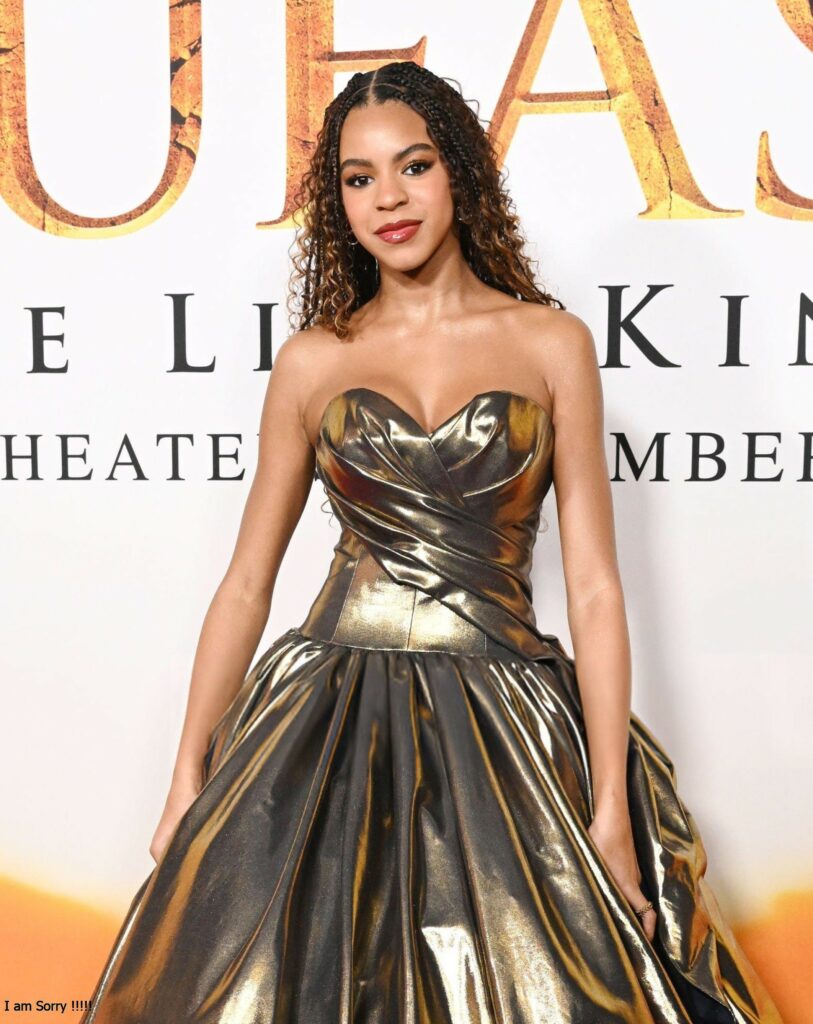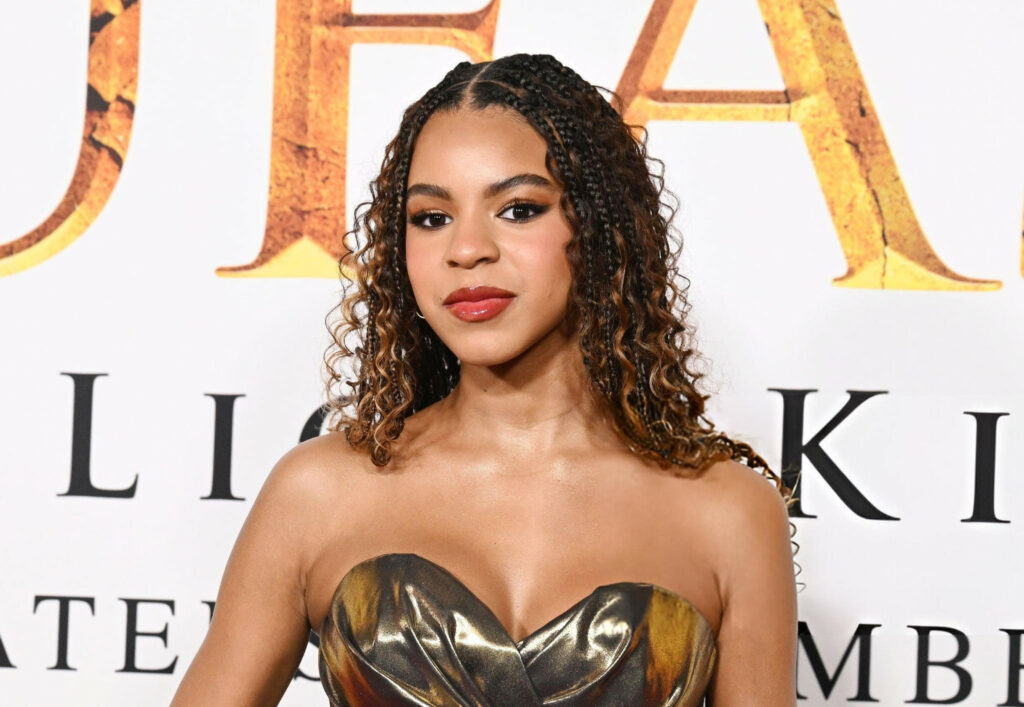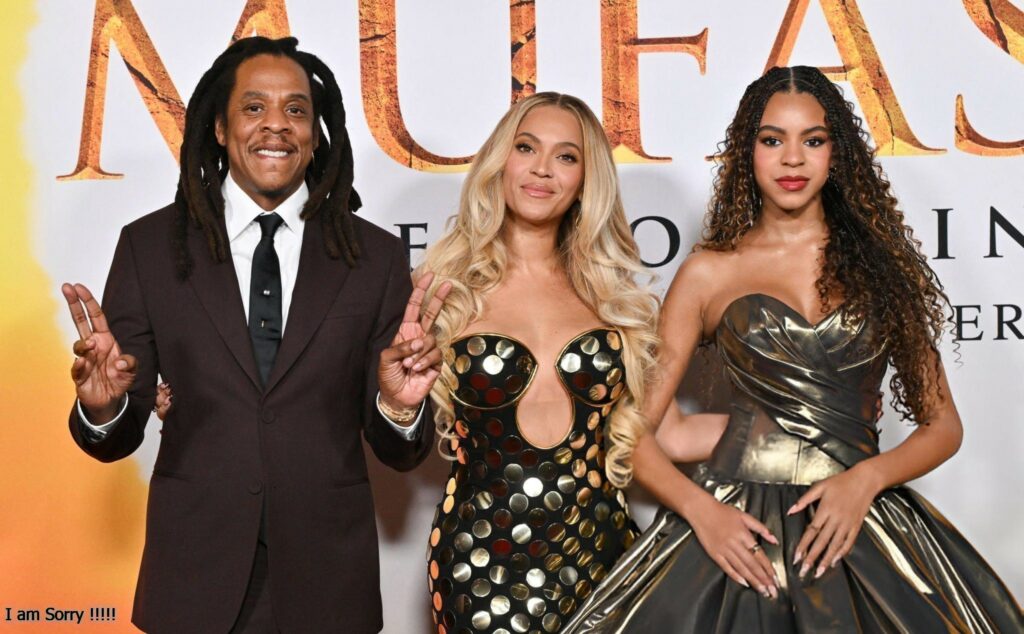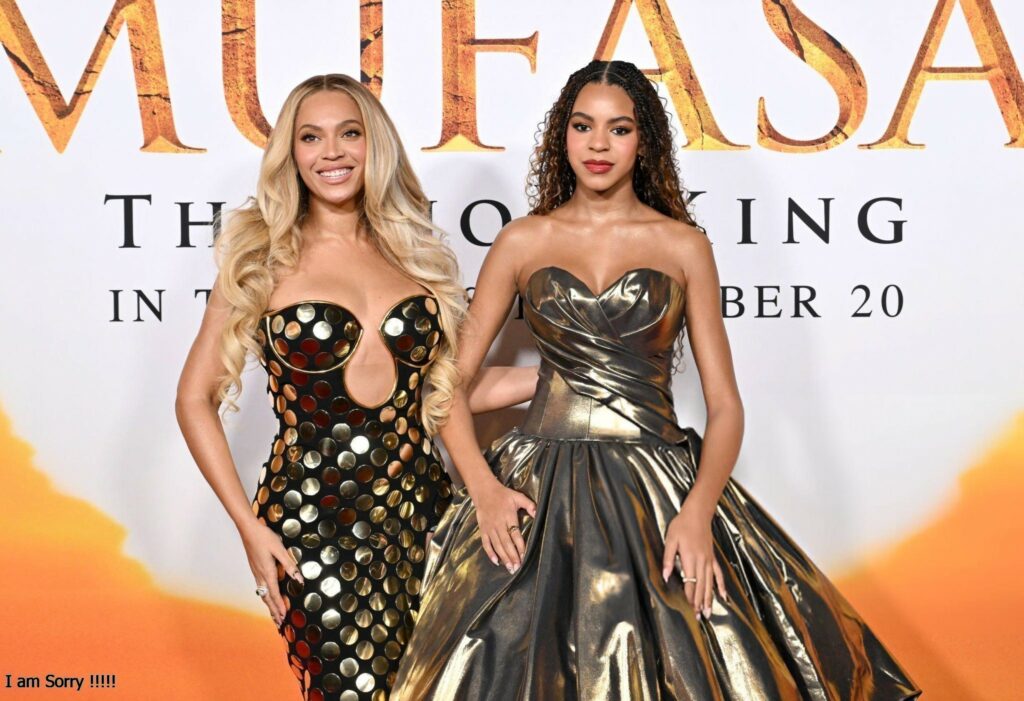Blue Ivy has recently garnered attention for her debut at the premiere of Disney’s “Mufasa: The Lion King,” where she captivated audiences not just with her presence, but also with her undeniable talent. However, what should have been a celebratory occasion was marred by online scrutiny and unwarranted criticism. Famous actress Christina Milian stepped forward to defend Beyoncé’s daughter against the harsh judgments that followed her appearance. Through this article, we will delve deeply into Milian’s supportive remarks, the backlash Blue Ivy faced, and the broader implications of societal expectations on young celebrities.

The Glamorous Debut of Blue Ivy Carter
The premiere of “Mufasa: The Lion King” marked a significant milestone for Blue Ivy, who lent her voice to the character of Kiara. With the spotlight firmly on her, this event represented not only a professional achievement but also a moment of pride for her family.
The Dress That Sparked Controversy
At just twelve years old, Blue Ivy dazzled in a stunning strapless gold dress, complete with a long train that evoked images of royalty. Many took to social media to express their admiration for her outfit, applauding her elegance and poise. Yet, amidst the praise were critical voices questioning the appropriateness of her attire. The stark divide in opinions highlights the challenges of growing up in the public eye.
The nature of celebrity culture often leads to intense scrutiny, especially for minors. Critics argued that the glamorous dress and makeup made Blue Ivy appear older than her actual age. Some comments suggested that wearing such an ensemble at twelve crossed the line into inappropriate territory. The irony lies in the fact that while many young girls aspire to emulate the fashion of their favorite stars, they are simultaneously judged for doing so.

Christina Milian’s Empowering Response
In response to the divisive commentary surrounding Blue Ivy, Christina Milian appeared on “Sherri Shepherd” to defend the young star. Her declaration that Blue Ivy looked gorgeous was more than just a compliment; it was a rallying cry against the public’s tendency to criticize young girls for expressing themselves through fashion.
Milian emphasized the importance of allowing children to shine without excessive judgment. Her statements resonate strongly with parents navigating the complexities of raising children in a world that can be unkind and unforgiving. By advocating for Blue Ivy, Milian reminded viewers that every child deserves to feel beautiful and confident, regardless of their age or the perceptions of others.
The Importance of Representation
For a young girl like Blue Ivy, stepping onto the red carpet and participating in high-profile events serves as powerful representation. She is not merely Beyoncé and Jay-Z’s daughter; she is carving out her own identity in a space traditionally dominated by adults. The more young girls see role models like Blue Ivy embracing their individuality, the more empowered they feel to explore their own self-expression.

As Milian noted, Blue Ivy’s experiences touring with her mother showcase her talent and dedication. These opportunities enable her to develop a sense of self that is authentic and inspiring. Instead of focusing on superficial aspects, society should celebrate the accomplishments and personality of young artists like Blue Ivy—she represents hope for future generations of ambitious girls.
The Social Media Backlash: A Double-Edged Sword
The digital landscape can be both a platform for empowerment and a breeding ground for negativity. For Blue Ivy, social media became a double-edged sword after her appearance at the “Mufasa” premiere. While some users celebrated her beauty, others inundated her with critical comments regarding her attire.
The Role of Social Media in Shaping Public Perception
Social media has transformed how people interact and communicate, often blurring the lines between personal opinion and public impact. In Blue Ivy’s case, her dress became a hot topic of discussion, illustrating how quickly perceptions can shift—and how damaging these perceptions can be for a young individual still figuring out her place in the world.
Critics on platforms like Twitter and Instagram expressed their concerns over Blue Ivy’s look, claiming it was inappropriate for her age. Comments like “let a girl dress like she’s 12 please” suggest an expectation for youth to conform to certain standards, especially when it comes to dress and appearance. This pressure can impose undue stress on young girls, forcing them to navigate adult worlds before they are ready.
The Impact of Parental Influence
With two famous parents, Blue Ivy lives under a microscope that most children do not experience. The influence of her parents undeniably affects how she views herself and her public persona. Beyoncé, known for her fierce protection of her family’s privacy, has taught Blue Ivy the importance of confidence and resilience in facing judgment.
When Beyoncé shared her pride in Blue Ivy’s accomplishments following the premiere, it sent a powerful message about familial support. Public figures wield significant influence over societal norms, and by supporting her daughter, Beyoncé encourages a climate where young kids can express themselves freely, despite the criticisms they may face.
The Need for Positive Role Models
Amidst the backlash, fans of Blue Ivy rallied to her side, calling for an end to the negativity directed at her. People began to advocate for a healthier narrative around young girls in the industry. The voices championing Blue Ivy serve as a reminder of the importance of positive role models—not just for young girls but for everyone who struggles against societal pressures.
Such advocacy emphasizes that children should not bear the weight of adult projections. Young girls, including Blue Ivy, need champions who recognize their talent, creativity, and potential beyond the superficialities of appearance.

Navigating Fame and Family Dynamics
Blue Ivy’s rise to fame comes with its own set of challenges, particularly concerning family dynamics. Being part of a high-profile family brings unique pressures and responsibilities that can be daunting for a child.
The Weight of Expectations
Growing up in a household with iconic figures like Beyoncé and Jay-Z undoubtedly sets high expectations for Blue Ivy. As she steps into her career as a voice actress, she explores the entertainment world that has shaped her upbringing. Although these experiences can provide valuable lessons, the accompanying pressure can be immense.
Expectations can manifest in various forms, from performance outcomes to public appearances. The scrutiny surrounding Blue Ivy’s dress at the premiere illustrates how closely watched she is—a reality that can lead to anxiety and self-doubt. It’s crucial for her parents to create a nurturing environment where she feels safe to express herself without the fear of making a misstep.
Finding Balance Between Life and Career
Beyoncé and Jay-Z’s commitment to their children’s happiness and well-being shines through in their parenting approach. Both parents emphasize education and self-discovery, allowing Blue Ivy to pursue her interests while still benefiting from their guidance. This nurturing environment encourages her to find a balance between her burgeoning career and her childhood, fostering her overall development.
Teaching her the value of hard work, humility, and compassion equips Blue Ivy with essential tools for life beyond the red carpet. Whether performing in a new film or navigating friendships, these principles will serve her well as she grows into adulthood.
The Importance of Communication
To ensure healthy family dynamics amid the chaos of fame, open communication remains vital. As Beyoncé and Jay-Z navigate the complexities of parenting in the public eye, they set an example of transparency and honesty with their children.
Discussing difficult topics, such as public scrutiny and societal expectations, allows Blue Ivy to process the experiences she faces. By normalizing these conversations, her parents empower her to maintain her sense of self amid the whirlwind of fame.
Understanding the Broader Context of Celebrity Culture
The tension surrounding Blue Ivy’s red carpet appearance opens a dialogue about the broader implications of celebrity culture and its impact on children.
The Critique of Societal Norms
The scrutiny placed on Blue Ivy’s outfit points to a wider trend where society often imposes rigid standards on youth, particularly girls. The harsh critiques reflect an ongoing conflict between childhood innocence and adult expectations. This tension creates unrealistic ideals that young girls are pressured to meet.
Moreover, the backlash reveals a disturbing tendency to sexualize young girls in the media, drawing lines between maturity and appearance that should not exist. As discussions unfold around Blue Ivy’s choice of clothing, they highlight the urgent need for societal change regarding how we perceive and treat children in the public eye.
The Role of the Entertainment Industry
The entertainment industry often exaggerates these societal pressures, creating environments where young stars must navigate complex dynamics. With adults frequently projecting their expectations onto children, achieving true authenticity becomes increasingly difficult.
However, there are also opportunities within the industry for positive representation of youth. By challenging stereotypical narratives and emphasizing individual stories, filmmakers and performers can contribute to a healthier image of childhood in popular culture.
Advocating for Change
As social media continues to shape public discourse, the voices defending Blue Ivy serve as a beacon of hope for change. Celebrities like Christina Milian play a pivotal role in steering conversations toward positivity and acceptance. Their advocacy highlights the importance of creating spaces where young individuals can thrive without fear of judgment.
This moment serves as a call to action for all to rethink how society approaches youth in the limelight. Understanding the emotional toll that public scrutiny can impose on children opens pathways for change to cultivate a more supportive culture surrounding young stars.
Conclusion
In the wake of Blue Ivy’s stunning red carpet debut at the “Mufasa: The Lion King” premiere, the conversation surrounding her experience reflects larger societal issues regarding the treatment of children in the public eye. With advocates like Christina Milian defending her, the discussion serves as a reminder that youth should be celebrated rather than critiqued.
Blue Ivy stands as a symbol of hope, individuality, and creativity. Navigating the complexities of fame while staying true to herself will be a journey, but with the support of her family and a community advocating for change, she is sure to continue shining brightly in her own right. Ultimately, it is time for society to protect the innocence of children and foster an environment where they can flourish without the burden of adult perceptions.
